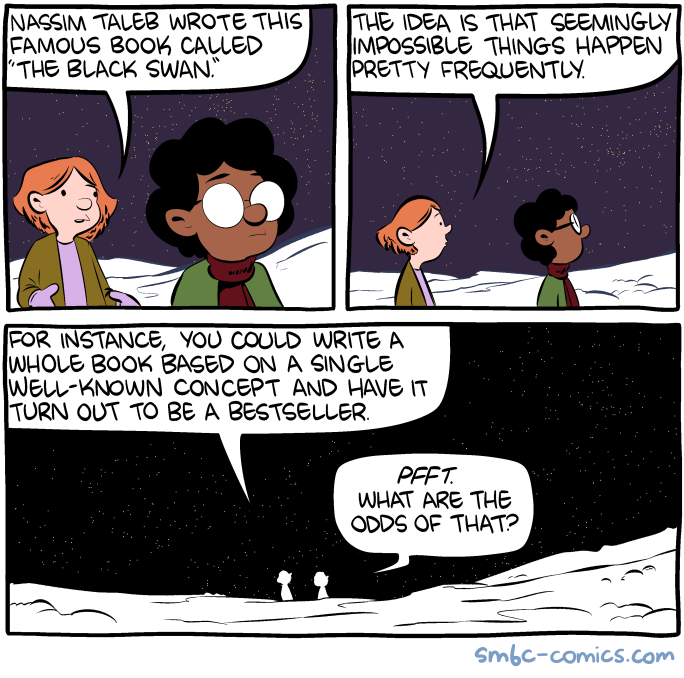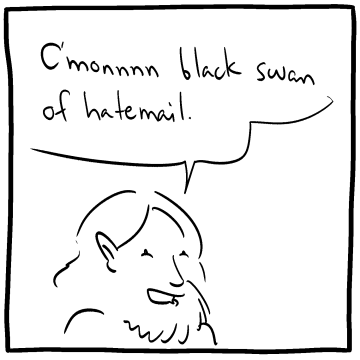Wednesday Book Reviews!
A Cartoon History of the Universe (book 2) (Gonick) I decided I’m gonna plow through these. This one was as good as the first, but with the same (in my opinion) tendency to sometimes rely entirely on myth for parts of the story. To Gonick’s credit, he tends to point out when he does this, but to me it makes the stories less enjoyable, insofar as they’re presented as history. Still, quite good, and I feel like I’m learning a lot from his art style.
The Hidden Life of Trees (Wohlleben) I really enjoyed this book. Wohlleben works in forest management, and has written a wonderful book on all the weird ways in which trees adapt to their environments and communicate with each other (using chemical signals, electric signals, etc.). It contains a ton of strange info - for example, apparently some bug-infested trees will chemically signal parasitoids to come eat the bugs that are harming the tree. The author also claims that old trees are more disease resistant because they can communicate with each other about what pathogens have entered the area. Wohlleben occasionally gets a little sappy and mystical about forestry, but all of his serious claims are either backed by scientific evidence or have a disclaimer that they’re just something he suspects is true.
The Utopia of Rules (Graeber) Dammit, Graeber. Every time I wanted to hate this book, he had something really insightful to say. This is my second time reading a Graeber collection, and this one is very similar. There are big, interesting, sweeping thoughts about how humanity and society work. I kinda like this - it’s a sort of throwback to the way people sometimes wrote in the 19th century, trying to grandly analyze The Whole Thing. On the other hand, as with those writers, Graeber often makes statements that are simply wrong.
For instance, he has a whole theory on why superhero comics are the most popular. It comes from an anthropological perspective, which is interesting, but completely neglects the fact that (as any comics dork can tell you) non-Superhero comic genres basically got killed off in the mid-50s by the Comics Code Authority. It’s possible the theory could be salvaged, but it’d have to bear the weight of that weird turn in history. And yet… he’s got so much insight, you find yourself wanting his advice then wanting to scream at him. It’s like a conversation with a brilliant polymath who doesn’t quite have every little fact straight, but who nevertheless is absolutely delightful.
One particular bit really stuck with me: Graeber described the idea that in modern life, people have ideas but then don’t pursue them because they find something vaguely similar on Google. This is obvious, but Graeber’s theory is that this effect may hold back progress more than we think. I’ve certainly observed other cartoonists doing this, whereas my personal rule is to never check google after I have an idea. It’s a waste of time, and it benefits nobody. A bit later (see next week’s book reviews) I happened to read Tom Standage’s book on the telegraph, in which an important occurrence was that Samuel Morse had no clue other people had tried and failed to make a long distance telegraph. I can’t help but wondering if our incredible connectivity today has more subtle negative consequences than we typically consider.
The Man Who Knew Infinity (Kanigel) A great biography of Ramanujan, with the one caveat (for the potential buyer) that, well… from the perspective of storytelling, Ramanujan’s life just wasn’t that exciting. Of course, as a mathematician (in ways I’m sure I don’t understand) he was one of the most incredible in history. But, perhaps for that reason, his life consists of a lot of sitting around, having abstruse discussions, and making poor dietary choices. It’s a very good biography, but it can’t help but feel a bit tedious here and there, when describing minor flaps between Ramanujan and his relatives, for instance. This sort of thing is made doubly tiresome by the fact that it seems we often don’t actually know the full nature of this or that disagreement, because Ramanujan is treated almost like a God by those who knew him. Still, quite good, and if you want to know about Ramanujan, this is probably the book!
Demerit: Kanigel repeats an incorrect etymology of the word “posh” in which it purportedly is a sea acronym for Port Outward Starboard Home. This is known to be false.



















